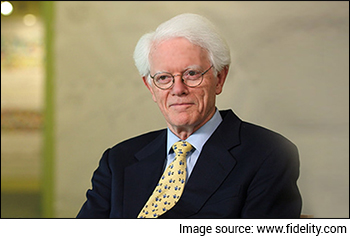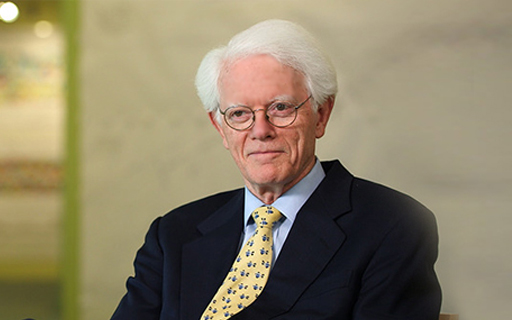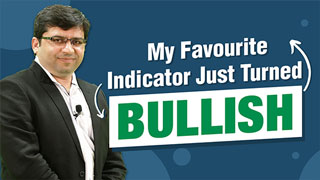- Home
- Outlook Arena
- Peter Lynch Portfolio
Peter Lynch Portfolio

Peter Lynch is heralded as one of the most successful investors of all time.
He was the manager of Magellan Funds at Fidelity Investments from 1977 to 1990. During these years, Peter Lynch grew the fund from US$ 20 million (m) to over US$ 14 billion (bn) in 13 years.
He averaged a 29.2% annual return on investment (before fees) which was substantially better than the S&P 500 Index, making Magellan the best performing mutual fund in the world.
Lynch has authored several classic books on investing, including One Up on Wall Street, Beating the Street, and Learn to Earn (with the latter co-authored with John Rothchild).
His books contain many invaluable investing tips. Lets have a look at his investing philosophy.
Peter Lynch's investing philosophy
His philosophy of investing is truly unique, yet it has a lot of common sense behind it.
Lynch believes in 'investing in what you know'. According to him, investors should invest in only those companies in which they understand the business model and fundamentals.
He is also a strong advocate of investing in undervalued companies. He believes companies with a price to earnings ratio below the industry average have the potential to perform better than others.
However, in a recent interview with the Wall Street Journal, Peter Lynch complained that investors apply his advice too loosely.
Buying what you know holds good only when the knowledge of the company is all-encompassing. Moreover, nothing - not even your long familiarity with the business - should overshadow the price you pay for the stock.
He is also credited with inventing the price-to-earnings-growth (PEG) ratio, which helps investors determine whether a stock is inexpensive given its growth potential, along with other stock valuation methods popular with value investor.
Peter Lynch's portfolio
When Peter Lynch joined Magellan, he had about 60 stocks and was advised to trim that number to 25-30.
He instead bought hundreds of stocks he believed were bargains, including the then-unusual step of owning multiple stocks from the same industry.
In 1989, Magellan held an unheard-of 1,400 stocks.
Although he was successful in juggling so many stocks, he is wary of over-diversification just the same.
Lynch says investors should own however many exciting prospects that they are able to uncover. On the other hand, Lynch warns against investment in a single stock.
One of Lynch's first successful investments was in an air-freight company called Flying Tiger, which helped him pay for graduate school.
Lynch's portfolio currently contains some of the largest winners during the 80s, including Apple, Fannie Mae and Eastman Kodak.
How to pick stocks like Peter Lynch?
Here are some of the key criteria that Lynch suggests investors consider before investing in a stock -
- Earnings Growth - A pattern of earnings growth reveals the stability and strength of a company. Ideally, earnings should move up consistently.
- The Price-Earnings ratio - This compares the current price to most recently reported earnings. Studying the pattern of PE ratios over a period of several years should reveal a level that is "normal" for the company. Comparing the ratio to the industry's may help reveal if the company is a bargain.
- Debt to equity ratio - A low debt to equity ratio provides manoeuvring room as the company expands or experiences trouble. Lynch is especially wary of bank debt, which can usually be called in by the bank on demand.
- Net cash per share - Net cash per share is calculated by dividing the net cash by the number of shares outstanding. High levels indicate financial strength.
- Dividend payout ratio - Lynch suggests that investors who prefer dividend-paying stocks should seek firms with the ability to pay during recessions and companies that have a 20-year or 30-year record of regularly raising dividends.
- Inventories - Lynch notes that, for manufacturers or retailers, a high level of inventory is a bad indicating that inventories are growing faster than sales. On the other hand, if a company is depressed, the first evidence of a turnaround is when inventories start to be depleted.
In conclusion,
Lynch never tried to time the market nor predicted its direction. If he believed in the company, he would invest in it.
If you wish to participate in the stock market and invest like Peter Lynch, it is essential that you do your homework.
Ensure you check the fundamentals and valuations of the business and stay updated on what the business does.
Also, aim for long term investments if you believe in the business. Don't try to time the market.
These small guidelines can take you a long way in your investing journey.
Happy Investing!
Disclaimer: This article is for information purposes only. It is not a stock recommendation and should not be treated as such. Learn more about our recommendation services here...
![]() Exide Stock Price: Undervalued or Overvalued?
Exide Stock Price: Undervalued or Overvalued?
Apr 9, 2024
Is Exide still undervalued after the price surge?
![]() These Smallcaps Deserve a Place on Your Watchlist
These Smallcaps Deserve a Place on Your Watchlist
Jan 23, 2024
Insider buying in these smallcaps warrant further research.
![]() Does Narayana Murthy's 70-Hour Workweek Formula Apply to Investing?
Does Narayana Murthy's 70-Hour Workweek Formula Apply to Investing?
Oct 31, 2023
Should you work 70 hours per week to become a successful investor?
![]() IEX: Can it Make a New High in FY24?
IEX: Can it Make a New High in FY24?
Apr 17, 2023
Will this ex-multibagger manage to turn its fortunes around in FY24?
![]() Look Beyond the Sensex for Life Changing Wealth
Look Beyond the Sensex for Life Changing Wealth
Feb 7, 2023
I believe the Indian stock markets are on their way to create huge wealth. However, to participate in this once in a lifetime opportunity, you need to look beyond the benchmark index.
![]() Peter Lynch's 10 Golden Rules of Investing
Peter Lynch's 10 Golden Rules of Investing
Aug 4, 2022
Follow these 10 tenets of investing by one of the most successful investors.
![]() The Secret to Beating the Nifty in the Long-Term
The Secret to Beating the Nifty in the Long-Term
Jul 21, 2022
Find out the secret to outperforming the Nifty over the long term.
![]() The One Smallcap Stock I'll Recommend Now
The One Smallcap Stock I'll Recommend Now
Jun 21, 2022
This aspect of investing has a very high weightage on your overall returns, but often gets ignored when winning stories are written.
![]() If I had to Recommend Just One Stock, it Would be this Smallcap
If I had to Recommend Just One Stock, it Would be this Smallcap
May 31, 2022
This aspect of investing has a very high weightage on your overall returns, but often gets ignored when winning stories are written.
![]() How You Can Get Lucky in the Stock Market
How You Can Get Lucky in the Stock Market
Apr 12, 2022
The blueprint to get lucky in stock markets.
![]() Top Smallcap Stocks for Your Watchlist
Top Smallcap Stocks for Your Watchlist
Feb 2, 2024
There smallcaps deserve a place on your watchlist.
![]() Mr Murthy's Advice: Is Hard Work Mandatory for Investing Success?
Mr Murthy's Advice: Is Hard Work Mandatory for Investing Success?
Nov 6, 2023
Are great long term return achievable without putting in 70 hours per week?
![]() 5 Investment Quotes from Global Gurus to Inspire Your Financial Success
5 Investment Quotes from Global Gurus to Inspire Your Financial Success
Aug 8, 2023
Investment quotes from some of the worlds leading gurus, that every smart investor must know about.
![]() To Create Life Changing Wealth Don't Buy Nifty Stocks
To Create Life Changing Wealth Don't Buy Nifty Stocks
Mar 10, 2023
I believe the Indian stock markets are on their way to create huge wealth. However, to participate in this once in a lifetime opportunity, you need to look beyond the benchmark index.
![]() My Smallcap Picks Beat the Index by 3X. Here's How I Did It...
My Smallcap Picks Beat the Index by 3X. Here's How I Did It...
Dec 6, 2022
Our smallcap recommendation service has beaten benchmark indices by over 3x. But this information would be incomplete without a few facts.
![]() My Favourite Indicator Just Turned Bullish
My Favourite Indicator Just Turned Bullish
Jul 31, 2022
Rahul Shah on his favourite stock market indicator.
![]() Forget FIIs. Follow These Experts to Navigate the Market
Forget FIIs. Follow These Experts to Navigate the Market
Jun 24, 2022
How you deal with the recent correction is going to be a great differentiator in your net worth.
![]() The Big Secret to Beating the Market
The Big Secret to Beating the Market
Jun 2, 2022
Find out the secret to outperforming the Nifty over the long term.
![]() The Rise of the Indian Domestic Investor: Myth or Reality?
The Rise of the Indian Domestic Investor: Myth or Reality?
May 9, 2022
Is the Indian domestic investor here to stay?
![]() Is Your Portfolio too Big to Handle? I have a Solution
Is Your Portfolio too Big to Handle? I have a Solution
Mar 25, 2022
My tips for managing a 100-Stock Portfolio.
FAQs
Who is Peter Lynch?
Introducing Peter Lynch to investors is like introducing Sachin Tendulkar to cricket fans. In short, he needs no introduction.
Peter Lynch is heralded as one of the most successful investors of all time.
He was the manager of Magellan Funds at Fidelity Investments from 1977 to 1990. During these years, Peter Lynch grew the fund from US$ 20 million (m) to over US$ 14 billion (bn) in 13 years.
He averaged a 29.2% annual return on investment (before fees) which was substantially better than the S&P 500 Index, making Magellan the best performing mutual fund in the world.
What is Peter Lynch's investing philosophy?
Peter Lynch firmly believed that individual investors had inherent advantages over large institutions. He posited that large firms can't or won't invest in smaller companies that have yet to receive attention from analysts or mutual funds.
Advocating the bottom-up approach to stock picking, his investing style can be summed up into three basic tenets; buy what you understand, always do your homework (research), and invest for the long term.
Which are the books written by Peter Lynch?
Once his stellar track record running the Magellan Fund gained widespread attention, Lynch went on to pen down several books outlining his philosophy on investing. He was never afraid of sharing his 'secret sauce' to great investing.
Some of the books by Peter Lynch are One Up on Wall Street, Beating the Street and Learn to Earn.
Which are the top stocks in India that pass the Peter Lynch filter?
As per Equitymaster's Stock Screener, these stocks could potentially meet Peter Lynch investing criteria.
- #1 TRENT
- #2 SHRIRAM TRANSPORT
- #3 TITAN
- #4 EICHER MOTOR
- #5 AVENUE SUPERMARTS
Peter Lynch is known to have made the 'buy what you know' formula famous. Much of his success is attributed to his knack for picking companies with businesses he understands and focusing on their earnings and assets.


















